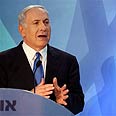
Making peace with a population
Op-ed: Meticulous analysis of lexicon chosen by Netanyahu during Bar-Ilan speech is indicative of gap between his recognition of Palestinian state, his recognition of Palestinian people
Netanyahu, thus, posits Israel as open to compromise, while the Palestinians are positioned as the rejectionists. While Netanyahu, since the 2009 Bar-Ilan Speech, has repeatedly acknowledged acceptance of a Palestinians state, it worthwhile to examine the extent to which he views the Palestinians as a legitimate people with historic links to the land.
A meticulous analysis of the lexicon chosen by Netanyahu during the same Bar-Ilan speech is indicative of a gap between the prime minister's recognition of a Palestinian state and his recognition of a Palestinian people, as follows:
"But our right to build our sovereign state here, in the land of Israel, arises from one simple fact: this is the homeland of the Jewish people, this is where our identity was forged… But we must also tell the truth in its entirety: Within this homeland lives a large Palestinian community… These two realities – our connection to the Land of Israel and the Palestinian population living within it – have created deep divisions in Israeli society."
Netanyahu's discursive strategy presents "we" as a people whose identity was forged in this homeland. Conversely, the Palestinians are not a people nor a nation, but a "community" or "population" "living within it" (our homeland) – an unfortunate turn of events which has caused serious internal divisions within Israel between the left and the right.
Another reality exists
The prime minister explicitly contrasts Jewish national rights and "connection to the land" with a population, at best, a community, that lives within our land. Thus, although this speech marked the first time that Netanyahu showed a readiness to accept a Palestinian state, he concurrently adopted a strategy which rejects Palestinian peoplehood.
Indeed, Netanyahu's acceptance of a Palestinian state is comparable to his assessment of the problematic nature of Palestinian recognition of Israel – the acceptance of an unfortunate set of circumstances due to a balance of power which cannot be denied, rather than Palestinian recognition of authentic Jewish national sovereignty.
Netanyahu is able to accept a Palestinian state as a solution to the unfortunate fact that another population lives in "our" land. However, if we analyze the same quotation, it becomes clear why he cannot take the additional step of recognizing the authenticity of Palestinian nationalism – his unequivocal belief that "this is the homeland of the Jewish people", without any room for another narrative that makes legitimate "homeland" claims.
Thus, while according to this exclusivist perception of the connection between the Jewish people and the Land of Israel, a Palestinian state can be acknowledged as an unavoidable circumstance, accepting the authenticity of a Palestinian people would require a far more difficult revision of the Zionist narrative and the recognition of the legitimacy of a competing narrative.
Netanyahu's repeated and unanswered call for Palestinian recognition of Israel as a Jewish state is, in essence, a desire to hear the Palestinian other accept his notion that "this is the homeland of the Jewish people," rather than merely an acquiescence to an unfavorable balance of power. However, the only possibility for hearing such words from President Abbas would be for Netanyahu to himself state that he is not merely ready to make peace with a "population" that lives in our land, but that another narrative, another reality exists – that this is also the homeland of the Palestinian people.
Elie Friedman is the project manager at the S. Daniel Abraham Center for Strategic Dialogue at Netanya Academic College. The study presented in this article will be presented at a conference dealing with Discourse, Culture and Education in the Israeli-Palestinian conflict on December 4 at Netanya Academic College










